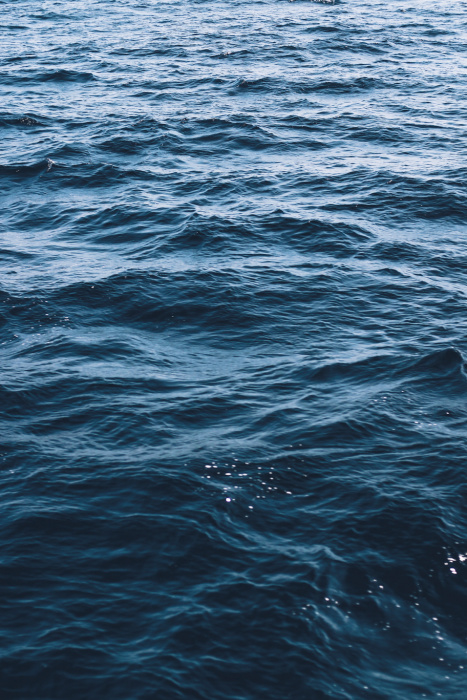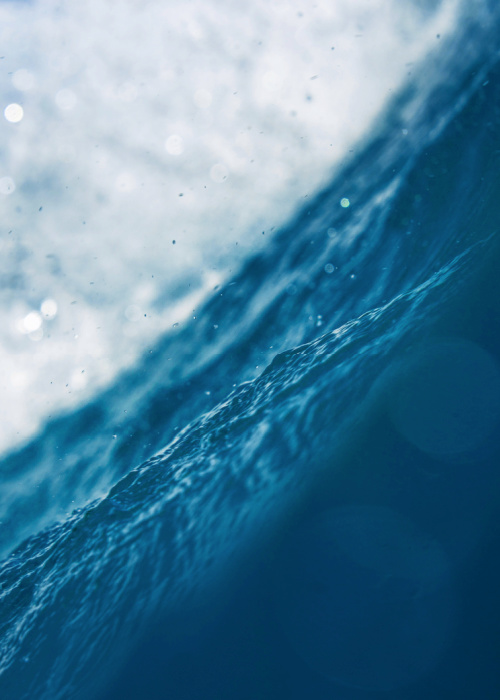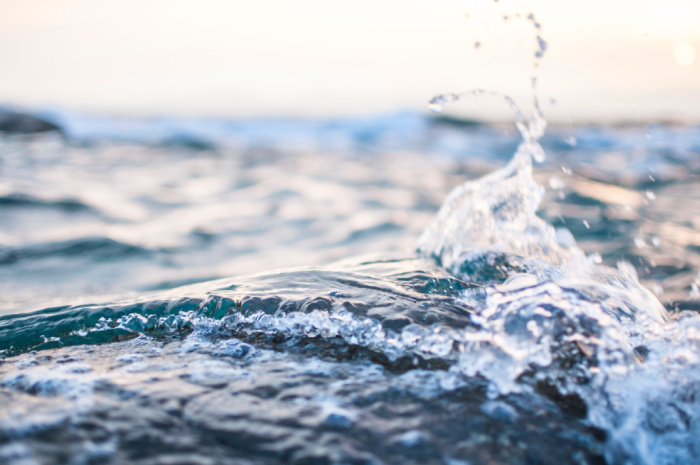Close your eyes. Take a deep breath in… hold for two… release.
Now picture this: You’re at your favorite beach. You feel the soft, warm sand between your toes as you make your way towards the waves. The cool, crisp ocean breeze brushes your hot skin, the sun beating down on you. The scent… you know that scent. It’s the hint of sunscreen and brine, indicating you’re about to hit the surf. Then, you feel it — the sensation of a wave washing over your feet as you wade into the ocean.
Maybe you keep going, moving deeper into the surf until you’re gently bobbing with the incoming waves. Or, maybe, you just stand still. You take the ocean in with all her glory. You feel a sense of peace and calm… of stillness.
You’ve found your blue mind.
Water for Your Well-Being
This is the blue mind mentality — it’s a slightly meditative, relaxed state of mind that we transition into when we’re near, in, on or under water. You may feel calm, collected or even creative, possibly curious or compassionate. In other words, it’s the effect that water has on our mental, emotional and physical well being. It’s an all-encompassing state of mind.
In “Blue Mind,” a bestselling novel from acclaimed marine biologist Dr. Wallace J. Nichols, we go on a journey that takes us through the effects of water on our health and well-being. From impacting all five senses to understanding how simply just looking at the color blue can calm us, Dr. Nichols combines cutting-edge neuroscience with anecdotes that show just how closely humans are tied to the substance that covers most of our planet.

In this digital age, our lives are overcome with constant connectivity, stress and work. As we start Mental Health Awareness Month, it’s important to remember to take time for self care. What better place to replenish our mind, body and spirit than near the water?
Think back to your earliest memory of water. Is it a family vacation? A school field trip? A time with friends?
“Since I was a kid, water has always been a place for me to find peace and go into reflective thought,” says Alayna Robertson, education interpreter II at the South Carolina Aquarium.
“I think even from a young age, it’s always been good for my mental health. Whether I was a kid sitting at the edge of a jetty letting my mind run with curiosity, or as an adult today who constantly walks to the pier at Waterfront Park [in Charleston] to clear my mind. It has an extremely regulating effect on me that helps to keep me present.”
As Alayna points out, water affects us from an early age, whether we realize it or not. How many times do you remember a family vacation, a road trip or a walk along a body of water? What emotions are you feeling as you remember those memories, even now? Water impacts us each time we’re near it, playing more of a role in our lives than we may realize.
Worldwide, about 450 million people have a mental illness – this equates to 1 in 4 people. Mental health, and maintaining blue mind, has never been more important.

Spiritual Pilgrims at the South Carolina Aquarium
Here at the Aquarium, we see firsthand the effects of blue mind on our guests. Often, we spot someone sitting in front of the Great Ocean Tank, mesmerized by the movement of the water and the creatures within. Relaxed and totally immersed in their own world, these guests are known as “spiritual pilgrims.”
“I love when I see a spiritual pilgrim! Some of the best conversations I’ve had with guests have been with people who are in awe of the fish and the beauty of the water,” shares Caroline Stroud, an education interpreter II here at the Aquarium. “I also feel that the connection they feel fuels passion and compassion for the animals and their ecosystems. I feel a sense of pride, not in myself, but in our facility and our team. I also feel connected and a sense of fellowship. Someone else is loving and appreciating something I love.”
Studies have shown that people can achieve blue mind in the wild, within our walls and in similar places. At the National Marine Aquarium in Plymouth, England, researchers performed a study to monitor blood pressure, heart rate and self-reported relaxation levels and moods of over 100 guests after they spent 10 minutes gazing into an aquarium exhibit. In the study, three different exhibits were used; one exhibit had no animals, one had a few animals and the other contained a robust habitat teeming with animals. The study found that after five minutes of observation, regardless of which exhibit the subjects were looking at, blood pressure dropped significantly. Additionally, the results of the study found that the most positive changes in heart rate, relaxation and mood happened with subjects who observed the exhibit full of life.
Even if you can’t get to a physical body of water, taking the time to visit your local aquarium can provide similar benefits to walking along the shoreline.
“It makes my heart happy seeing these individuals [spiritual pilgrims],” comments Selina Bohland, education interpreter II at the South Carolina Aquarium. “I know how it makes me feel taking in the Great Ocean Tank and other exhibits we have and I think everyone deserves to have that feeling. It makes me feel relaxed, calm, at peace, whole, appreciative, connected, inquisitive, sometimes emotional.”
Into the Water
We’ve touched on how being near and around water can have a positive, healthy effect on our minds, but what about being in the water?
Ryan Yuen, assistant dive safety officer and aquarist for the Aquarium, describes what he experiences when he dives:
“I don’t really experience much emotions once the dive is progressing; I’m not in my thoughts. I just get to observe the present, which for me is a huge bit of zen,” says Ryan. “On dry land, I’m always thinking ahead or behind; I’m too much of a planner and a thinker. Being underwater is my freedom and release… Midwater, 60 feet above the ‘ground’ [ocean floor] but still 60 feet below the surface, hovering on my back, staring at the sun glinting through: That has been one of the most peaceful-happiest times I’ve had.”

Similar to what Ryan describes above, in “Blue Mind,” Dr. Nichols discusses how the monotony and familiarity of water actually allows us to relax our brains.
“Think about it: water is changing all the time, but it’s also fundamentally familiar. It seems to entertain our brains nicely with novelty plus a soothing, regular background… It’s regularity without monotony — the perfect recipe to trigger restful involuntary attention. It’s also the inverse of our current condition of monotonous suffocation.”

Rolling with the Waves
In today’s society, having a “red mind” of constant anxiety and stress is more prevalent than ever. Mobile devices have made it impossible to disconnect, and social media is almost an Olympic sport. All of this in combination with the fast-paced environment of today’s world makes for a stressful, anxiety-induced state of mind. This in turn makes us feel overloaded and like we’re running on fumes, needing a recharge.
Enter: Blue mind.
Now is the perfect time to create healthy habits that you can carry with you through Mental Health Awareness Month and beyond.
Take some time for you. Prioritize you. Celebrate you. Take that trip to Folly Beach, Sullivan’s Island, Isle of Palms or your favorite ocean hideaway. Go for a boat ride on a river, kayak on your local lake or paddle board through the saltmarsh. Let your mind relax to the tune of endless waves, nature’s sound machine. Immerse yourself in the soothing blues and greens of wild places.
Find your blue mind, and celebrate it by joining the rest of us spiritual pilgrims at the Aquarium!
Published April 29, 2022


